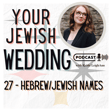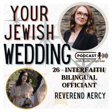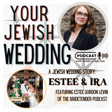
9 - Is a Truly Interfaith Ceremony Even Possible for Us? (Plus - Addressing Co-Officiation)
Concerned that your "interfaith ceremony" will actually turn out to be a single-faith ceremony with a shoutout or two to the "second-tier" tradition?
Don't write off an interfaith ceremony just yet! Trust me, it's NOT impossible - it just takes a particularly conscious preparation. In this episode, we'll go over some things you should consider as a couple before getting in to the details of your interfaith ceremony, including:
- What are the most important parts of a wedding ceremony in your faith or culture? Which are non-negotiable?
- Is there a chance that your traditional prayers would include wording that excludes or invalidates your partner's faith?
- What are the barriers to your comfort with your partner's faith or cultural wedding traditions?
Don't forget - you can reach me any time at www.yourohiorabbi.com.
Fill out the contact form there if you'd like to work with me on your wedding.
IG: @yourohiorabbi
Send questions for me to answer on this podcast to:
Hope to see you next time! Remember - there is ALWAYS more learning to do!
<3 Rabbi LeighAnn








